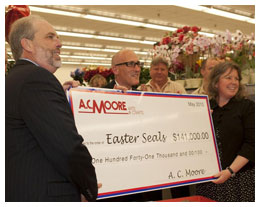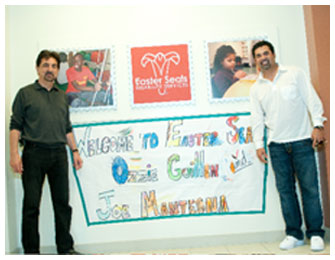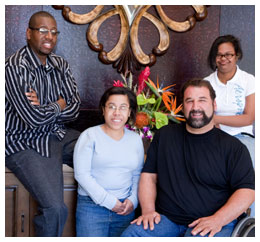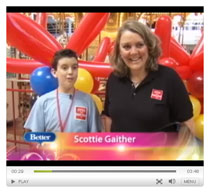A.C. Moore crafting a new world for people with autism
by Patricia Wright
 I have a lot of talents. Crafting, however, is not one of them. Asked to use my hands to contribute to the crafting community, I stretch out my finger, press a button on the computer keyboard, and link to Etsy. Etsy is my “place to buy and sell all things handmade” — I link there regularly to purchase cool earrings from crafters.
I have a lot of talents. Crafting, however, is not one of them. Asked to use my hands to contribute to the crafting community, I stretch out my finger, press a button on the computer keyboard, and link to Etsy. Etsy is my “place to buy and sell all things handmade” — I link there regularly to purchase cool earrings from crafters.
So when the fabulous crafting store A.C. Moore Arts & Crafts decided to work with Easter Seals to promote autism awareness and raise funds to provide services and supports for people with autism, I wasn’t too sure. I mean, I know a lot about autism, I just wasn’t sure how autism and crafting could connect. Well … this simply proves that I have a lot to learn!
A.C. Moore champions the message Crafting a Better World in their cause marketing work. This message is a great match for Easter Seals and autism awareness. In April, A.C. Moore provided autism awareness and education to every customer who purchased something at their check-out stand. That month they also hosted a free Make and Take crafting activity that involved a jigsaw puzzle. The puzzle piece is almost ubiquitous with autism awareness, and A.C. Moore’s jigsaw craft made the autism and crafting connection I was wondering about! The event was extremely popular in communities. Not only did A.C. Moore educate thousands of customers about autism, they also raised $141,000 for Easter Seals to use to deliver local autism services.
The top fundraising store for this campaign was in Delaware, and a few of us from Easter Seals were able to travel out there earlier this month to celebrate with the store. Through collaboration with corporate partners like AC Moore, Easter Seals is able to educate and serve so many more people with autism. And, I got to visit a craft store for the first time ever. Who knew there were so many cool things at A.C. Moore? I will definitely be making a return visit!









 Recently my family and I had the opportunity to attend the annual Easter Seals Celebration of Giving in San Diego. Every year Easter Seals honors its corporate partners at this event, and this year I had the awesome opportunity to reunite with many of my Easter Seals colleagues and meet some of the past representatives who served Easter Seals with great honor and dignity.
Recently my family and I had the opportunity to attend the annual Easter Seals Celebration of Giving in San Diego. Every year Easter Seals honors its corporate partners at this event, and this year I had the awesome opportunity to reunite with many of my Easter Seals colleagues and meet some of the past representatives who served Easter Seals with great honor and dignity.